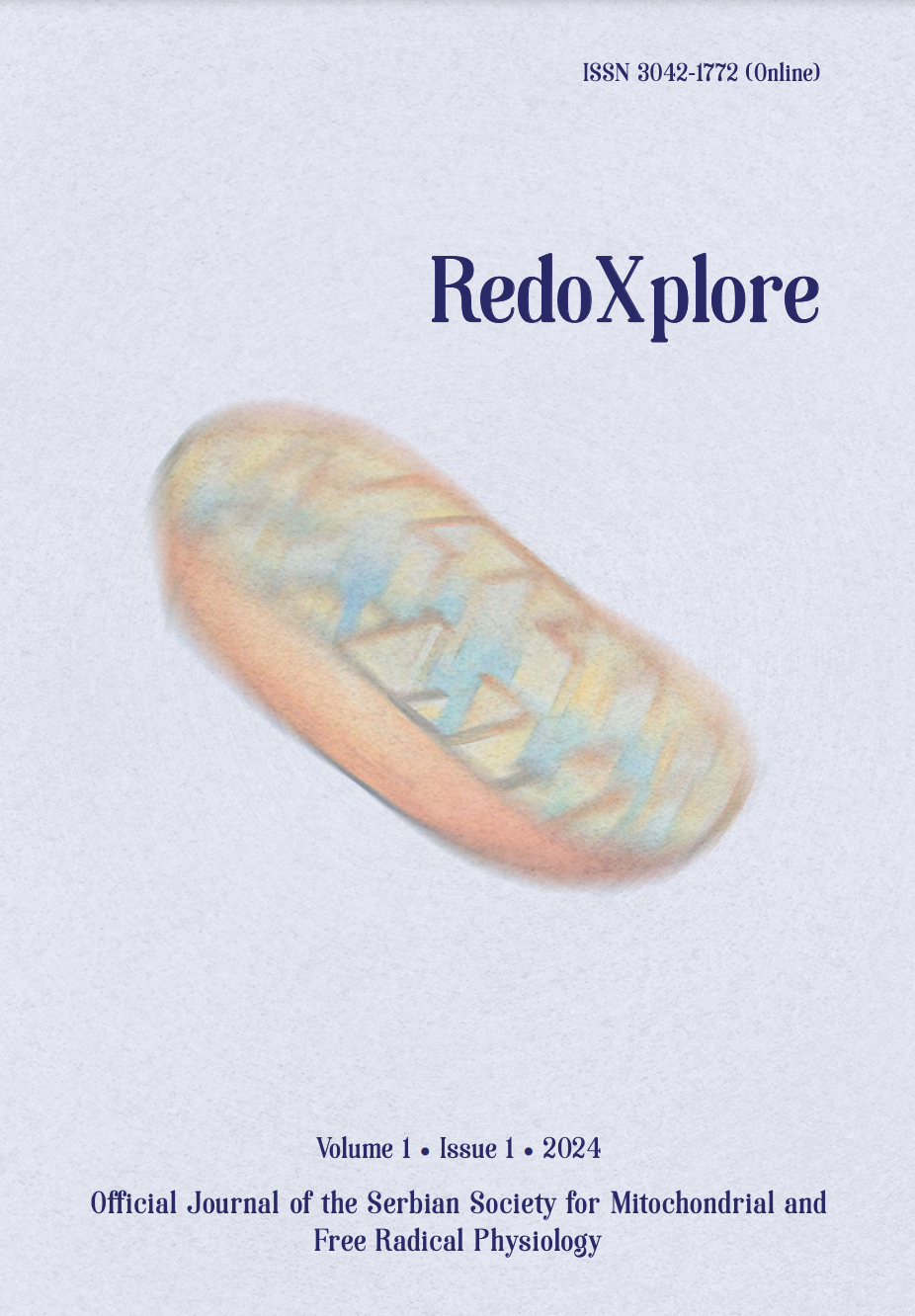
More articles from Volume 1, Issue 1, 2024
REDOX AND METABOLIC REPROGRAMMING OF BREAST CANCER CELLS AND ASSOCIATED ADIPOSE TISSUE - THE CORNERSTONES OF ADAPTIVE TUMOUR BEHAVIOUR
INSULIN MODULATES MITOCHONDRIAL STRUCTURAL AND FUNCTIONAL MOSAICISM IN BROWN ADIPOCYTES
NITRITE MITIGATES OXIDATIVE BURST IN ISCHEMIA/REPERFUSION IN BRAIN SLICES
NITRIC OXIDE, SUPEROXIDE AND PEROXYNITRITE – REDOX REGULATION OF THE CARDIOVASCULAR SYSTEM BY NITRO-OXIDATIVE STRESS AND S-NITROS(YL)ATION
DIETARY NITRATE AS PIVOT ON THE GUT MICROBIOTA-HOST REDOX COMMUNICATION
Citations

0
THE ROLE OF NRF2-DEPENDENT METABOLIC REPROGRAMMING OF BROWN ADIPOSE TISSUE IN ORTHOTOPIC BREAST CANCER MODEL
Institute for Biological Research "Sinisa Stankovic" - National Institute of Republic of Serbia, University of Belgrade , Belgrade , Serbia
Institute for Biological Research "Sinisa Stankovic" - National Institute of Republic of Serbia, University of Belgrade , Belgrade , Serbia
Institute for Biological Research "Sinisa Stankovic" - National Institute of Republic of Serbia, University of Belgrade , Belgrade , Serbia
Institute for Biological Research "Sinisa Stankovic" - National Institute of Republic of Serbia, University of Belgrade , Belgrade , Serbia
Faculty of Biology, University of Belgrade , Belgrade , Serbia
Institute for Biological Research "Sinisa Stankovic" - National Institute of Republic of Serbia, University of Belgrade , Belgrade , Serbia
Institute for Biological Research "Sinisa Stankovic" - National Institute of Republic of Serbia, University of Belgrade , Belgrade , Serbia
Faculty of Biology, University of Belgrade , Belgrade , Serbia
Editor: Bato Korac
Published: 29.08.2024.
Short oral presentations
Volume 1, Issue 1 (2024)
Abstract
Breast cancer is characterized by specific metabolic changes that support tumorigenesis, highlighting the emerging appreciation of cancer as a metabolic disease. These metabolic changes are simultaneous with redox reprogramming with nuclear factor erythroid 2-related factor 2 (Nrf2) representing their master integrator. Given that interscapular brown adipose tissue (IBAT) influences whole-body metabolism, our goal was to investigate the redox-metabolic crosstalk between the tumor and the host at the systemic level by exploring Nrf2-driven metabolic changes that occur in IBAT in the orthotopic model of breast cancer in wild-type (WT) and mice lacking functional Nrf2 (Nrf2KO). We analyzed the protein expression of key enzymes involved in glucose and lipid metabolism in control groups and at different points during tumor growth (10 mg, 50 mg, 100 mg, 200 mg, and 400 mg). In both WT and Nrf2KO mice, the results indicated a transient induction of hexokinase 2 expression during the early phase of tumor growth (<100 mg). Accordingly, pyruvate dehydrogenase expression followed the same profile. In Nrf2KO mice, a general decline in glyceraldehyde 3-phosphate dehydrogenase, phosphofructokinase-1, and glucose-6-phosphate dehydrogenase expression was detected during the late phase of tumor growth (>100 mg). Since no changes in WT mice occurred, these findings are considered Nrf2-dependent. Concomitantly, a decrease in protein expression of fatty acid synthase and acetyl-CoA carboxylase in Nrf2KO mice was observed. These observations correspond to decreased levels of 5'-AMP-activated protein kinase and hypoxia-inducible factor 1 during the late-phase (>100 mg) of tumor growth in Nrf2KO mice which suggests their involvement in transcriptional regulation. Our results revealed that IBAT metabolism responds to tumor growth and underscored that this communication is Nrf2-dependent giving implications for further understanding of breast cancer in the light of systemic metabolic disease.
This research was supported by the Science Fund of the Republic of Serbia, #7750238, Exploring new avenues in breast cancer research: Redox and metabolic reprogramming of cancer and associated adipose tissue - REFRAME.
Citation
Copyright

This work is licensed under a Creative Commons Attribution-NonCommercial-ShareAlike 4.0 International License.
Article metrics
The statements, opinions and data contained in the journal are solely those of the individual authors and contributors and not of the publisher and the editor(s). We stay neutral with regard to jurisdictional claims in published maps and institutional affiliations.






